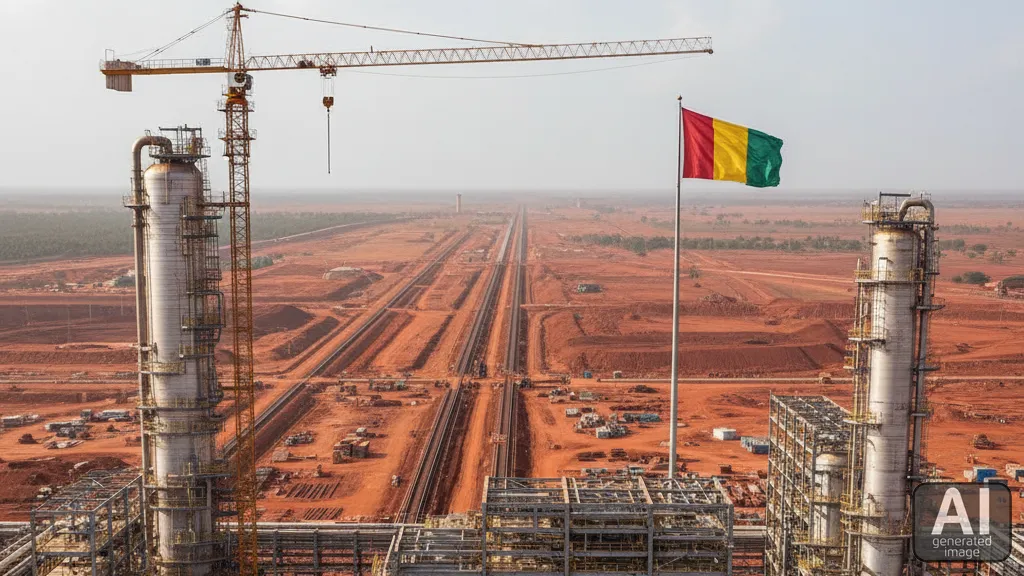Guinea to Accelerate Alumina and Iron Ore Processing to Boost Local Industry

Guinea accelerates alumina and iron ore processing, targeting six refineries by 2030 to boost local industry and lead West Africa’s mineral industrialization.
Guinea is embarking on an ambitious industrial transformation aimed at ending decades of dependence on raw mineral exports. The government has announced plans to fast-track the development of alumina refineries and iron ore processing plants, a decisive move to ensure that more of the country’s vast mineral wealth is processed domestically rather than exported in raw form. As the first shipments from the Simandou iron ore project approach, this strategy underscores Guinea’s goal of becoming a regional hub for mineral-based industrialization and reducing its vulnerability to fluctuating global commodity prices.
Minister of Mines Bouna Sylla confirmed that construction has already begun on Guinea’s first alumina refinery, developed in partnership with China’s State Power Investment Corporation (SPIC). The refinery is slated for completion by the end of 2027 and represents the first of several large-scale processing projects under negotiation. Additional agreements are progressing with Chinalco and France’s Alteo, while discussions continue with Compagnie des Bauxites de Guinée (CBG) and Alcoa to expand the country’s refining capacity. By 2030, the government plans to establish five to six refineries, capable of producing up to 7 million metric tons of alumina annually. This aligns with Guinea’s recent decision to revoke Emirates Global Aluminium’s (EGA) bauxite concession for failing to meet its local refinery obligations, signaling a stricter enforcement of domestic value-add requirements.
Parallel to these developments, Guinea is prioritizing iron ore processing as it prepares for full-scale production at the Simandou mine, one of the world’s largest untapped iron ore deposits. Both Rio Tinto and Winning Consortium Simandou (WCS) are contractually required to conduct feasibility studies for either a 500,000-ton steel plant or a 2 million-ton iron pellet facility, designed to support the country’s entry into the green steel supply chain. Guinea’s proximity to Europe and the United States gives it a distinct logistical advantage, particularly for exports of pellets and direct reduced iron (DRI) used in low-carbon steel production.
Energy supply, however, remains a critical bottleneck for these industrial ambitions. To address this, the government is pursuing a diversified energy strategy that includes hydropower, solar, and liquefied natural gas (LNG) projects. Among these initiatives is a US-backed LNG import plan, intended to provide a stable and cleaner power source for upcoming refineries and steel facilities. According to the World Bank, successful implementation of these projects could fundamentally reshape Guinea’s economy by creating thousands of skilled industrial jobs, enhancing export revenues, and driving long-term economic stability.
With six alumina refineries targeted by 2030 and new steel and pellet plants in the pipeline, Guinea is positioning itself at the forefront of West Africa’s next phase of industrial development. This shift toward domestic processing represents a critical step in capturing greater value from natural resources, supporting the global transition to cleaner materials, and solidifying the country’s role as a key supplier of refined minerals and green steel inputs to international markets.
Mini-Glossary
- Alumina refinery: A plant that processes bauxite ore into alumina, the intermediate material used to produce aluminum.
- Pellet plant: A facility that compresses iron ore fines into pellets suitable for steelmaking.
- Direct reduced iron (DRI): A form of iron produced using natural gas or hydrogen instead of coal, used in green steel production.
- Green steel: Steel manufactured with reduced carbon emissions through renewable energy or hydrogen-based technologies.
- Value chain: The series of production stages that add value to a resource before it reaches end consumers.
